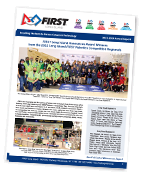Starting a Team
What you will need:
Professional engineers, sponsors, adult mentors, high school-aged students, a meeting place and access to both tools and free time during the build and competition season. Specifics and a season overview are available in the How to Start a Team Flyer.
What is the structure of an FRC team?
There is no FIRST-mandated team structure. FIRST DOES require each team assign an adult over age 18 to the official team roles of Main, Alternate and Shipping Contact. Other than that, you are free to structure your team as you deem best! Most teams comprise 25 students (there is no maximum) and can be made up of one or more high schools or youth organization(s). We also have home-schooled teams that compete. More information about team structure is available in the FRC Team Handbook.
Ready to get your team going?
Step One: Register your information on-line in our Team Information Management System.
By registering your information, you will become a part of the FIRST Robotics Competition Community and begin receiving communications about the organization. You will also receive a temporary team number in preparation of event registration in the fall. Please note that completing this stage of the process does not commit you to becoming a team. You are only considered a registered team after your team has selected an event (during the fall registration period). You may withdraw and receive a refund at any time prior taking delivery of your builder’s kit.
Step Two: Get in touch with the Regional Director in your area.
The Regional Director and/or Senior Mentor know the teams, schools and businesses in your area. He/she can help you form a plan for getting your team funded, organized and in touch with other teams in the area for mentoring assistance.
Step Three: Read the following key FIRST documents.
Starting an FRC Team Outline — details what you need to get started and lists resources to help you on your way.
FRC Handbook — a how-to guide for directing your team through the season. Includes tips on recruiting, team organization and sample team budgets.
FIRST Mentoring Guide — tips on how to be a great adviser for your team.













 Forms & Downloads
Forms & Downloads Shop FIRST® Long Island
Shop FIRST® Long Island
